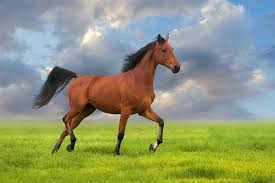
Mustang
Conditions of detention
Mustangs are incredibly hardy and adaptable, capable of thriving in a variety of environments. They do well in large pastures where they can roam and graze freely, mimicking their natural habitat. They need access to shelter to protect them from extreme weather.
Useful Fact: Mustangs are known for their resilience and ability to thrive in challenging environments, making them well-suited to outdoor living with minimal shelter compared to more domesticated breeds.
Nutrition and diet
In the wild, Mustangs survive on a diet of grasses, shrubs, and other vegetation found in their natural habitat. When kept domestically, their diet should consist of high-quality forage, such as hay, and possibly grain or supplements, depending on their activity level and health.
Useful Fact: Mustangs have efficient metabolisms due to their wild ancestry, which means they can often maintain their condition on a forage-based diet with minimal grain supplementation.
Health
Mustangs are generally very healthy due to their genetic diversity and natural selection in the wild. However, they can be prone to hoof issues if not managed properly, as their hooves are adapted for rugged terrain. Regular veterinary care, including dental check-ups and vaccinations, is necessary.
Useful Fact: Mustang hooves are often exceptionally strong and well-shaped naturally, but they may require regular trimming to maintain their health, especially if kept on softer ground than they are used to in the wild.
Grooming and care
Mustangs have thick coats that protect them in harsh weather, and they typically require standard grooming. Regular brushing helps keep their coat in good condition and provides an opportunity to check for any signs of injury or illness.
Useful Fact: Because they are not as selectively bred for appearance as domestic breeds, Mustangs often have low-maintenance coats and manes, making them relatively easy to care for in terms of grooming.
Education and training
Mustangs are highly intelligent and can be trained for a variety of purposes, from riding to working cattle. However, they may require more patience and time to train than domestic horses, especially if they were captured from the wild. Consistent, gentle training methods work best.
Useful Fact: Mustangs that are adopted from the wild often undergo a “gentling” process, where they are gradually acclimated to human handling, which is crucial for their successful transition to domestic life.
Toys and entertainment
Mustangs are curious and enjoy mental stimulation. Toys like treat dispensers, puzzle feeders, and even natural objects like logs or rocks can keep them entertained. Providing variety in their environment is key to preventing boredom.
Useful Fact: Mustangs often enjoy exploring new environments or objects, so incorporating natural elements into their living area can help keep them mentally engaged.
Safety
Mustangs are strong and independent, requiring secure fencing to keep them contained. Because of their wild instincts, they may attempt to test boundaries more than domestic horses, so fencing should be sturdy and well-maintained.
Useful Fact: Mustangs are often more aware of their surroundings than domesticated horses and can be quicker to react to perceived threats, making secure fencing essential for their safety.
Accessories
Mustangs require basic tack, including a well-fitted saddle, bridle, and protective gear if they are used for riding or working. Tack should be introduced gradually, especially for those newly adopted from the wild.
Useful Fact: Due to their often smaller, more compact build compared to some domestic breeds, finding properly fitted tack can require more customization or adjustment.
Socialization
Mustangs are social animals and thrive in a herd environment. They should have regular interaction with other horses, which helps them feel secure and reduces stress. Human interaction should be gentle and consistent, especially in the early stages of domestic life.
Useful Fact: Mustangs that are well-socialized with other horses often adapt more quickly to domestic life, as they rely heavily on social cues from their herd mates.
Travel and Transportation
Mustangs can be more challenging to transport than domestic horses, particularly if they are not yet fully acclimated to human handling. It’s important to take time to introduce them to trailers slowly and ensure they are comfortable before embarking on longer journeys.
Useful Fact: Mustangs are generally very sure-footed, which can make them more stable during transport once they are accustomed to the trailer environment.
Behavior and psychology
Mustangs are known for their strong survival instincts, intelligence, and independence. They can be more cautious or reactive than domesticated horses, especially in unfamiliar situations, but they are also highly trainable and loyal once they trust their handler.
Useful Fact: Building trust with a Mustang can take time, but once established, they often form strong bonds with their handlers and can be exceptionally loyal and reliable partners.
Legal aspects
Owning a Mustang, especially one adopted through the BLM, involves specific legal considerations. Adopters must meet certain requirements and agree to terms that include providing appropriate care and not selling the horse for at least a year. Compliance with these regulations is crucial.
Useful Fact: Mustangs adopted through the BLM come with specific legal protections, and adopters are often subject to checks to ensure the horse is being properly cared for, making adoption a commitment to the horse’s well-being.


